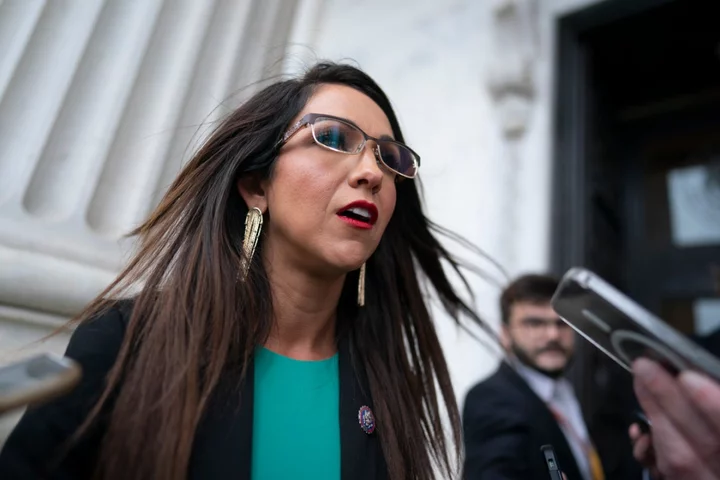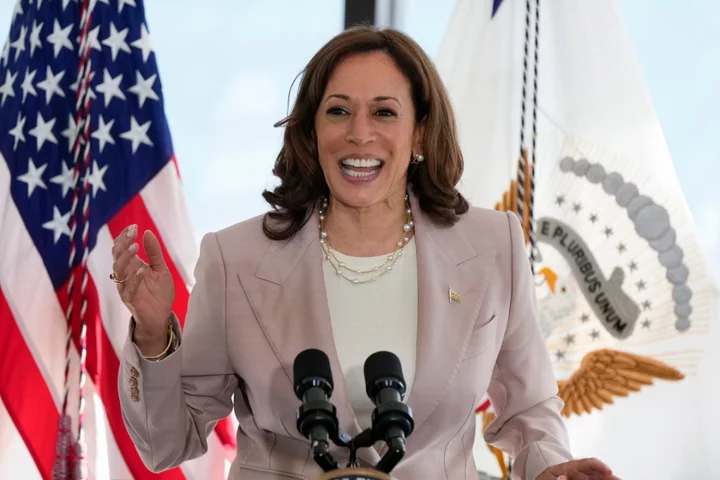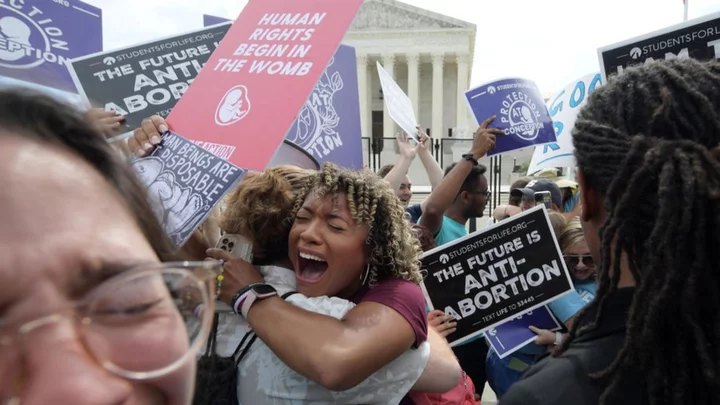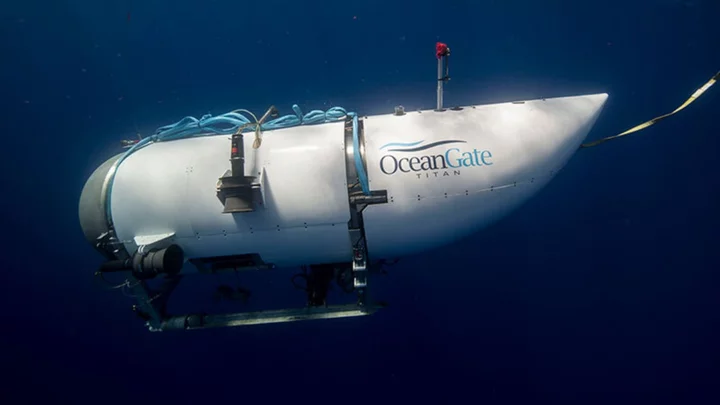
Lauren Boebert reveals she’s officially a grandmother as she avoids question about Marjorie Taylor Greene spat
Congresswoman Lauren Boebert has announced she has become a grandmother at the age of 36. Ms Boebert, who has insisted in the past that raising a child is cheaper than paying for birth control, made the announcement while dodging a question about her spat with congressional colleague Marjorie Taylor Greene. Ms Greene called Ms Boebert a "little b****" on the House floor during a spat. Ms Boebert sat down for an interview with Sean Hannity the next day during which he asked about the feud. That's when Ms Boebert revealed she became a grandmother. "Sean, I did not put my life on pause and leave my four boys and my now grandson to come here and just get in spats with people," she told the host. "I came here to legislate and to be effective for Coloradans, Coloradans who are suffering from the Democrats’ policy. Marjorie is not my enemy. Joe Biden’s policy, the Democrats, that is my enemy that I am combating right now." The new grandchild belongs to her 17-year-old son Tyler. Ms Boebert first announced that her child was having a child in April. “So I’m going to tell you all for the first time in a public setting, that not only am I a mom of four boys, but come April I will be a gigi to a brand new grandson. And Jason and I are so excited to welcome this new life into our family,” she told the crowd at a Moms for America event. She told the same crowd that there was “something special” about rural communities because their teen moms did not abort pregnancies as often as urban teenagers did. Data from the US Centres for Diease Control and Prevention shows that teenage mothers are less likely to finish high school than their childless counterparts. Ms Boebert is a living example of that statistic; she dropped out of high school in 2004 when she became pregnant. She only finished her GED in 2020 a month before her first primary contest during her congressional race. “Now my son when I approached him and told him, ‘Tyler, I’m going to be a 36-year-old grandmother.’ He said, ‘well didn’t you make granny a 36-year-old granny,’” Ms Boebert said during the Moms for America event. “I said, ‘Yes, I did.’ He said, ‘Well then it’s hereditary.’” She told the audience that she was proud of her son’s partner for not seeking an abortion. Read More Lauren Boebert accuses Marjorie Taylor Greene of spitting on her lip after being called ‘a little b****’ GOP's Boebert wanted to impeach Biden, but House Speaker McCarthy had other plans AOC implores Greene and Boebert to not waste time with Biden impeachment: ‘We should actually be working’ AP News Digest 3:20 am GOP's Boebert wanted to impeach Biden, but House Speaker McCarthy had other plans Marjorie Taylor Greene calls Lauren Boebert a ‘little b****’ on House floor
2023-06-24 01:24

Brazillian pop star Anitta drops hotly-requested track Funk Rave
Anitta has finally shared 'Funk Rave' after fans went wild for its live debut earlier this month.
2023-06-23 18:58

Biden and Harris joining key reproductive rights groups ahead of Dobbs anniversary
President Joe Biden and Vice President Kamala Harris are set to join a trio of key reproductive rights activist groups to mark the one-year anniversary of the Dobbs Supreme Court decision Friday, highlighting what's expected to be a major Biden campaign plank for the 2024 presidential election.
2023-06-23 17:22

Casper Star-Tribune: Judge blocks Wyoming's first-in-nation ban on medication abortion
Medication abortion will remain legal in Wyoming for now after a district judge on Thursday blocked the state's ban on abortion pills, according to the Casper Star-Tribune.
2023-06-23 11:20

Supreme Court rules against Navajo Nation’s access to drought-stricken Colorado River, despite US treaty
The Supreme Court ruled on Thursday against the Navajo Nation in a dispute concerning the tribe’s access to the drought-stricken Colorado River. Critics says the decision harms a community where an estimated one-third of tribal members lack running water and furthers the history of the US government breaking its promises to tribes. The case, Arizona v Navajo Nation, centres on the obligations of an 1868 treaty, which established the Navajo reservation as the tribe’s permanent home, following their forced removal from their ancestral lands by the United States military. The tribe argued that under the treaty, the US government has an obligation to evaluate the tribe’s need for water and factor that analysis into how it divides up water access to the Colorado River, which serves over 40 million people and passes through seven states. The US government, as well as the states of Arizona, Nevada, and Colorado, and various water districts in California, argued against the tribe in consolidated appeals. They claimed that the tribe’s interpretation of the treaty would undermine existing agreements on sharing the water from the Colorado and create and impose unsubstantiated obligations on the US government to develop water infrastructure for the tribe. In a 5-to-4 decision, all but one of the high court’s conservatives ruled against the tribe. “In light of the treaty’s text and history, we conclude that the treaty does not require the United States to take those affirmative steps,” Justice Brett Kavanaugh wrote in the majority opinion. “And it is not the Judiciary’s role to rewrite and update this 155-year-old treaty. Rather, Congress and the President may enact — and often have enacted — laws to assist the citizens of the western United States, including the Navajos, with their water needs.” The court’s three liberal justices, as well as the Trump-appointed Neil Gorsuch, an advocate for tribal rights, dissented. “The Navajo have waited patiently for someone, anyone, to help them, only to be told (repeatedly) that they have been standing in the wrong line and must try another,” he wrote in his dissenting opinion. He argued, alongside the tribe, that the Navajo weren’t forcing the US government to immediately start building water infrastructure or changing water claims on the river, but rather begin the process of fully accounting for what the nation needed. Navajo representatives criticised the ruling. "My job as the president of the Navajo Nation is to represent and protect the Navajo people, our land, and our future,” Navajo Nation president Buu Nygren said in a statement after the ruling. “The only way to do that is with secure, quantified water rights to the Lower Basin of the Colorado River.” With a population of about 175,000 and a land mass larger than West Virginia, the Navajo Nation is the largest US tribal reservation, and the Colorado River and its tributaries flow alongside and through the tribe’s territory. “The US government excluded Navajo tribal citizens from receiving a share of water when the original apportioning occurred and today’s Supreme Court decision for Arizona v. Navajo Nation condoned this lack of accountability,” John Echohawk, executive director of the Native American Rights Fund, one of the many Indigenous groups that filed briefs in support of the Navajo Nation, said in a statement. “Despite today’s ruling, Tribal Nations will continue to assert their water rights and NARF remains committed to that fight.” In 2003, the Navajos sued the federal government regarding access to the Colorado River, while the tribe has also fought for access to a tributary, the Little Colorado River, in state court. As The Independent has reported, many on the Navajo nation struggle for basic water access. “If you run out [of water] in the evening, you have to get up earlier the next day to make sure that there’s water for the kids to wash hands, brush their teeth, make breakfast,” Tina Becenti told The Independent. “It was time-consuming and took a lot of energy.” Tribes were cut out of initial deals made to allocate the water on the Colorado River, leaving many to rely on thousands of unregulated wells, springs, and livestock troughs that are spread across the reservation, which can pose a serious health risk. According to the Environmental Protection Agency, these sources may contain bacterial or fecal contaminants, along with unsafe levels of uranium and arsenic – a legacy of mining on Navajo land which began with the US military’s Manhattan Project for nuclear weapons in 1944 and continued until 2005. The fate of the Colorado River has become increasingly contentious, as the vital waterway dwindles under heavy demand and a changing climate. In May, following years of tense negotiations, Arizona, California, and Nevada agreed to cut their use of water from the Colorado in exchange for $1.2bn in federal funding, a last-minute compromise that staved off catastrophic impacts to agriculture, electricity generation, and water supplies to major cities like Phoenix and Los Angeles. The high court decision follows a ruling this month on another topic with a long and complicated history involving tribal groups: adoption. Last week, a 7-2 majority ruled to preserve the Indian Child Welfare Act, defending the law’s preference for the foster care and adoption of Native children by their relatives and Tribes, which was implemented following investigations that revealed more than one-third of Native children were being removed from their homes and placed with non-Native families and institutions, cutting off important family and cultural ties. Louise Boyle and Alex Woodward contributed reporting to this story. Read More Father of 13 dies in Colorado rafting accident after saving his children from danger Feds announce start of public process to reshape key rules on Colorado River water use by 2027 Nevada fight over leaky irrigation canal and groundwater more complicated than appears on surface Supreme Court rules against Navajo Nation in Colorado River water rights case Feds announce start of public process to reshape key rules on Colorado River water use by 2027 Vegas water agency empowered to limit home water flows in future
2023-06-23 09:21

Dan + Shay will join 'The Voice' in 2024 as first-ever coaching duo
Country music duo Dan Smyers and Shay Mooney, known as Dan + Shay, are gearing up to put their music expertise to use.
2023-06-23 03:15

13 Audiobooks You Didn’t Know Were Narrated by Celebrities
Uncover the best audiobooks narrated by celebrities, from beloved childhood classics like “Little Women” to hard-hitting contemporary tales like Celeste Ng’s 2022 book, “Our Missing Hearts.”
2023-06-23 00:27

RFK Jr.'s reign of error: Correcting the record about yet another false claim he just made
Robert F. Kennedy Jr., a Democratic candidate for the presidency, went on the Jordan B. Peterson podcast on June 5 and told a wild and false story about me from 2005 that I want to tell you about.
2023-06-23 00:20

Kamala Harris says goddaughter’s friends are choosing college towns on abortion legalisation
Vice President Kamala Harris has said she knows of young people choosing which college they want to attend based on how restrictive the abortion laws are in that state. Commenting in an interview for the Roe v Wade retrospective on MSNBC’s The ReidOut, Ms Harris said her goddaughter told her that her friends wanted to attend schools in states where there was more freedom in terms of reproductive rights. Ms Harris told the roundtable: “When the decision came down she told me ‘Do you know what’s happening? My friends – whatever gender – are starting to make decisions about where they will actually go to college depending on what’s happening in that state.’” “Because of course, if you look at it, I think the number is something like 23 million women of reproductive age live in states that have banned abortion, and what that is gonna mean for those 23 million, for the myriad of health care issues that are at stake ... It’s having a real impact on all types of decisions people make,” she added. The show took a look back at the decision to overturn the landmark Roe v Wade decision that legalised abortion in the US in 1973 when the Supreme Court ruled that “unduly restrictive state regulation of abortion is unconstitutional”. In 2022, the Supreme Court, packed with three Trump-era appointees, overturned Roe v Wade and returned decisions on abortion freedom to the states. Since then, a number of states have introduced effective abortion bans that limit the procedure to the very early days of pregnancy – often before women are aware they are pregnant. Some states have also criminalised assisting women with accessing abortion, and limited abortion to cases of rape or incest. Ms Harris said that the Supreme Court’s decision last year had infringed on women’s rights. “The idea that the highest court in our land just did that and rolled back rights that had been recognized was incredibly shocking,” she said on MSNBC. She said that after she learned the news of the ruling, she called her husband and shared some “words not meant for television at this moment”. Ms Harris went on to say that the ruling means that some have to “suffer in silence,” the thought of which made her “angry and sad”. Read More Where abortion laws stand in every state a year after the Supreme Court overturned Roe A year after fall of Roe, 25 million women live in states with abortion bans or tighter restrictions Judge to weigh suspending Wyoming's first-in-the-nation ban on abortion pills US prepares for potential end of Roe v Wade - live When will there be a Roe v Wade decision? Why these prosecutors are refusing to enforce anti-abortion laws
2023-06-22 23:59

She helped kill Roe v Wade - what does she want now?
Kristin Hawkins has relentlessly pursued one goal - to make abortion unthinkable and unavailable.
2023-06-22 07:48

Biden administration looks to reinstate protections for endangered species curbed by Trump
The Biden administration announced a proposal Wednesday to strengthen the Endangered Species Act, including repealing Trump-era rules that loosened protections for vulnerable species.
2023-06-22 05:20

Submarine vs. Submersible: What’s the Difference?
There’s a reason nobody’s referring to the missing ‘Titanic’ submersible as a submarine.
2023-06-22 02:49
